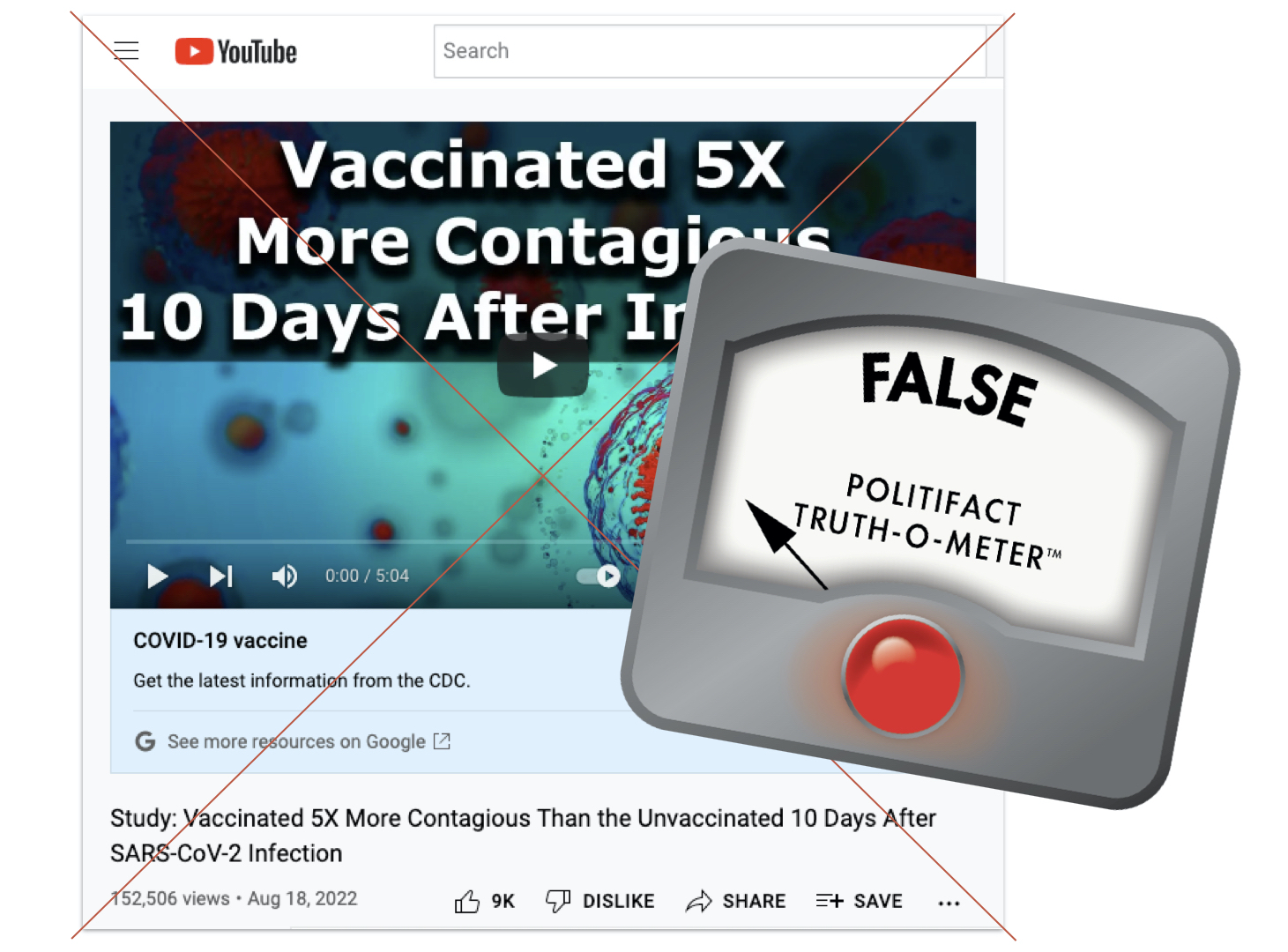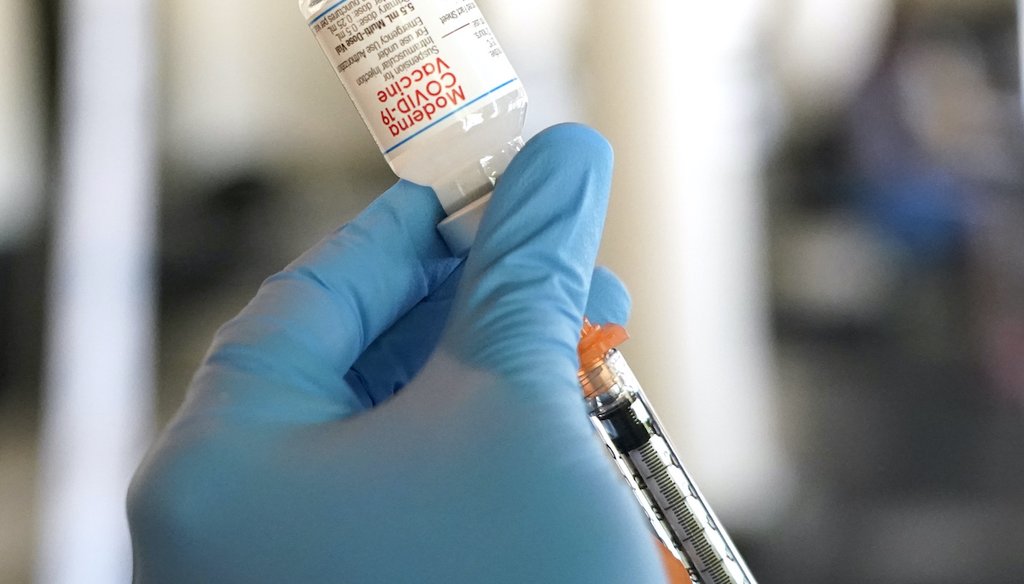

Our only agenda is to publish the truth so you can be an informed participant in democracy.
We need your help.


A Jackson-Hinds Comprehensive Health Center nurse loads a syringe with the Moderna COVID-19 vaccine at an inoculation station next to Jackson State University in Jackson, Miss., on July 19, 2022. (AP)
A study published in the New England Journal of Medicine found that people infected with delta or omicron variant COVID-19 could shed virus and remain potentially infectious for six to eight days after the onset of symptoms or their initial positive polymerase chain reaction (PCR) test.
The study did not find that people vaccinated against COVID-19 remain contagious for COVID-19 longer or recover more slowly than people who were not vaccinated against the virus.
The study has important implications about how long people should isolate after they contract COVID-19 to avoid infecting others, said one of the study’s co-authors, Dr. Amy Barczak of Massachusetts General Hospital.
A new study did not prove that getting a COVID-19 vaccine could keep you contagious for longer if you’re infected with the virus compared with not getting vaccinated.
But a social media post argued the contrary. An Aug. 18 YouTube video shared on Facebook claimed that a new study found that vaccinated people were "5X more contagious than the unvaccinated 10 days after SARS-CoV-2 infection."
SARS-CoV-2 is the novel coronavirus that causes COVID-19.
The video’s host displayed a screenshot of a New England Journal of Medicine study, which he said determined that "individuals fully vaccinated and boosted against COVID-19 seem to recover markedly more slowly from the illness and surprisingly even remain contagious for lengthier periods of time as compared to the unvaccinated."
Now more than ever, it’s important to sort fact from fiction. Please donate to support our mission.
The post was flagged as part of Facebook’s efforts to combat false news and misinformation on its News Feed. (Read more about our partnership with Facebook.)

(Screenshot from YouTube.)
The video identified a study by Massachusetts researchers affiliated with Brigham and Women’s Hospital, Massachusetts General Hospital and the Ragon Institute, which studies immunology. The New England Journal of Medicine published the study July 21.
From July 2021 to January 2022, the researchers asked 66 people with "newly diagnosed" COVID-19 to provide additional nasal swab samples three times a week for two weeks — or until they tested negative for COVID-19 with a PCR test.
Researchers studied people infected with the delta or omicron BA.1 variant. Sixteen participants were unvaccinated, 37 were vaccinated and 13 were vaccinated and boosted.
One of the study’s co-authors, Dr. Amy Barczak, an infectious disease specialist at Massachusetts General Hospital, said the study aimed to examine how long people infected with the delta or the omicron coronavirus variants shed detectable virus.
Despite the video’s claims, the study did not find that people vaccinated against COVID-19 remain contagious longer or recover more slowly than people who were unvaccinated against the disease.
"There would be no way to make this calculation from our data," Barczak said.
In fact, the study reported no differences between vaccinated and unvaccinated patients when it came to the amount of time it took for a PCR test to switch from positive to negative or to the amount of time it took a culture test, or an attempt to grow live virus in culture from a nasal swab, to switch to negative.
Barczak said the study’s key finding was that people infected with the delta or omicron variant shed virus and were thus potentially infectious for a median of six to eight days from the onset of symptoms or a positive SARS-CoV-2 test. Some people remained potentially infectious for up to 10 days.
In December 2021, the Centers for Disease Control and Prevention recommended shortening the isolation period for people infected with COVID-19 in non-health-care settings from 10 days to five days.
The study’s findings are important, Barzack said, "because it has implications for the time one should isolate after they develop SARS-CoV-2 to avoid infecting others."
Researchers cautioned that the findings were limited by the small sample size of 66 COVID-19 cases.
A video shared on Facebook claimed that a study found that vaccinated people were "5X more contagious than the unvaccinated 10 days after SARS-CoV-2 infection."
The study in question found that people infected with COVID-19’s delta or omicron variant shed virus and were potentially infectious for a median of six to eight days — and up to 10 days — after the onset of symptoms or their initial positive PCR test.
It also reported no differences between vaccinated and unvaccinated patients when it came to the amount of time it took for a PCR or viral culture test to switch from positive to negative.
We rate these claims False.
YouTube, "Study: vaccinated 5X more contagious than the unvaccinated 10 days after SARS-CoV-2 infection," Aug. 18, 2022
Email interview with Dr. Amy Barczak of Massachusetts General Hospital’s Infectious Diseases Division and a scientist at the Ragon Institute, Aug. 22, 2022
The New England Journal of Medicine, "Duration of shedding of culturable virus in SARS-CoV-2 omicron (BA.1) infection," July 21, 2022
The New England Journal of Medicine, "Supplementary appendix: Boucau J, Marino C, Regan J, et al. Duration of shedding of culturable virus in SARS-CoV-2 omicron (BA.1) infection," July 21, 2022
Reuters, "Fact check-NEJM study does not show that unvaccinated people with COVID are infectious for less time than the vaccinated," Aug. 1, 2022
Centers for Disease Control and Prevention, "CDC updates and shortens recommended isolation and quarantine period for general population," Dec. 27, 2021
Ragon Institute of MGH, MIT and Harvard, accessed Aug. 23, 2022
In a world of wild talk and fake news, help us stand up for the facts.
